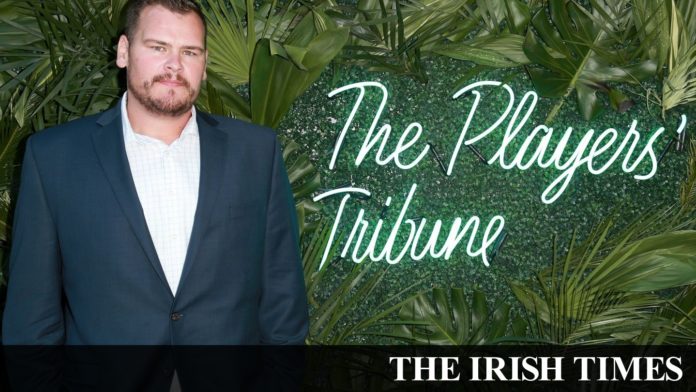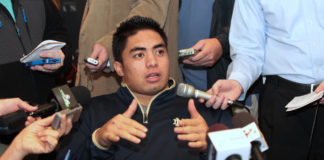Ryan O’Callaghan isn’t your average guy, nor is he an average NFL star who starred in special teams as an offensive lineman from 2008-2011.
As a lineman, he played over 50 games for the New England Patriots and the Kansas City Chiefs. However, during our conversation, football is Ryan’s backstory, barely rising to the surface.
You see, O’Callaghan isn’t even a huge football guy – metaphorically, literally, he’s 6ft7in and looks precisely like a lineman.
“I never loved football. Football for me was just solely a cover for being gay,” explains O’Callaghan from his home in Colorado.
O’Callaghan grew up in rural California in the late 80s and early 90s and decided to hide his sexuality.
“California is a huge state just physically, and it’s very different. It’s got very different areas. The main population centres, LA, San Francisco, are very liberal, but most of the land is extremely conservative.
“I come from far north, about 200 miles north of San Francisco, and it’s very, very conservative up there, even more so today than when I was growing up. There wasn’t any LGBTQ representation and certainly no public acceptance of it in any way.
“I also grew up in the late ’80s, early ’90s, so we didn’t have the internet. Really, being where I was from and hearing the things that my family would say about LGBTQ people, that’s what really drove me deep into the closet.”
So, how exactly does a kid struggling with his sexuality end up getting a scholarship to college at California Golden Bears playing football and then going in the fifth round in the NFL draft to the New England Patriots and then being signed by the Kansas City Chiefs?
“I took the stereotypes that I knew about gay guys, and I just tried to turn them on their head. Before football, I was hanging out with a band and drama kids, and that’s the worst place for a closeted gay boy to hide.
“Being a big kid, I was naturally pre-athletic, so I was good at football and realised that most people there were too ignorant to realise that a gay guy could play football and play at the top level. I ran with that plan and I tried to make the most of it. I didn’t start playing football until high school. It never was like a long-term plan.
“I didn’t have dreams of playing in Division 1 college or going in the NFL but, as the years went on, I realised my potential and how good of a cover it was for being gay, so I just kept with it.”
Off the field, Ryan was your average teammate. He was close with his teammates, admitting he kept them close to track what lies he told to who, but he was also constantly worried someone would try and out him, thinking if it happened, he’d be exiled and ultimately abandoned by his friends and family.
“Through high school, I was able to [avoid dating girls]. I was young, and you have an excuse not to be dating. Once you get to college, you’re an adult, living on your own, on the football team, there’s a lot of temptations and expectations.
“I got with a girl once because I thought my buddies were testing me. I thought they may be suspecting that I was gay, but I had rehearsed that. If that ever happens, what do I do? I knew exactly what to do, and it was extremely difficult.
Always worried
“I was pretty good at manipulating conversations and lying to people and making them believe that I had a girlfriend back home or just different things like that. Hiding my sexuality was always in the back of my mind, something I was always worried about. I took the approach of being very honest about everything else. That way, I can keep track of those lies.
“I told them about dating or things having to do with my sexuality. I was still able to connect on other levels, and I was pretty good at controlling conversations. I definitely felt the pressure and the stress, but I did a pretty good job of managing it just by being very honest about everything else in my life”.
Slowly, depression began to set in, coupled with some bad injuries. With six shoulder surgeries, among many other issues, O’Callaghan was no stranger to painkillers, but it was the end of his career when he had two injuries in a row.
“I knew that my career was coming to an end. I really started to spiral out of control mentally. I think anyone who’s taken a strong opioid painkiller knows that not only do they get rid of the pain, but they give you this euphoric feeling that makes you not feel like yourself and me back then hating myself. I love that feeling because it made me forget about everything I had to deal with. I quickly became addicted, and being in the NFL, I had a lot of disposable income, so I could get as many doses I could possibly take. I’m pretty lucky that I just didn’t overdose at one point.”
Ryan was eventually pulled by the Kansas City Chiefs athletic trainer. He was asked would he go see a psychologist and have a chat. O’Callaghan said yes, fearing if he said no, everyone would suspect he was hiding something.
“I agreed to go speak with Dr Wilson. After speaking with her for quite a few months, as the season went on, and I knew what my plan was, I decided I would tell her. Up to that point, she knew about drug use. She didn’t know the extent of it, and she didn’t really know the main issues.
“For the first time, I said the words ‘I’m gay’. First thing after I told her that, she stood up and gave me a hug and told me that I wasn’t the first player to sit right there and tell her the same thing.
“It wasn’t her acceptance that I felt like I needed to save my life, but having her say that and being that closely connected to someone else in that position instantly made me take a deep breath.
Commit suicide
“I ended up telling her my plan to commit suicide, my fears about family and why I felt that way. As logical of a thinker, as I think I am, she basically said, ‘Well, if you’re just going to kill yourself, why don’t you find out if you need to?’”.
O’Callaghan went back to conservative California and told his family and friends. His dad wasn’t overly ecstatic, but their relationship now is better than ever.
“I don’t regret the path I took just because I’m in a fabulous position now. If I could go back to when I first realised that I was gay, I would tell myself, ‘just come out, it’ll be okay’ because I really didn’t start living until I was 30 years old. If I could just start living when I was 15, who knows what would have happened?”
O’Callaghan has recently spoken to City Football Group, owners of Man City and NYCFC, about being a more welcoming environment. The NFL had O’Callaghan on their official float for Pride in America and, more importantly, he’s inspired others by writing a book called My Life On The Line, from which all the money goes towards the Ryan O’Callaghan Foundation, which supports talented LGBTQ youth.








